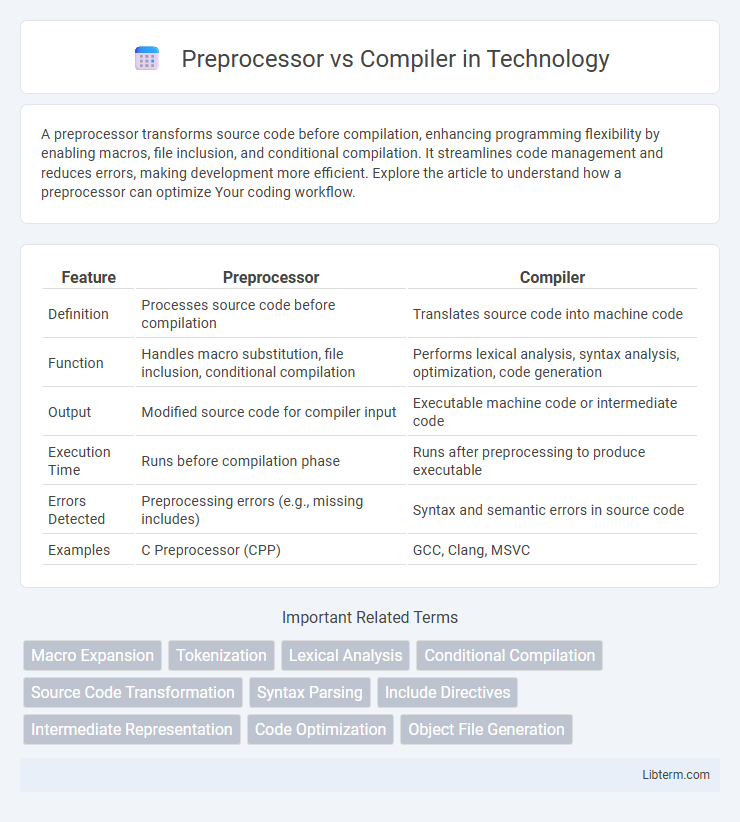A preprocessor transforms source code before compilation, enhancing programming flexibility by enabling macros, file inclusion, and conditional compilation. It streamlines code management and reduces errors, making development more efficient. Explore the article to understand how a preprocessor can optimize Your coding workflow.
Table of Comparison
| Feature | Preprocessor | Compiler |
|---|---|---|
| Definition | Processes source code before compilation | Translates source code into machine code |
| Function | Handles macro substitution, file inclusion, conditional compilation | Performs lexical analysis, syntax analysis, optimization, code generation |
| Output | Modified source code for compiler input | Executable machine code or intermediate code |
| Execution Time | Runs before compilation phase | Runs after preprocessing to produce executable |
| Errors Detected | Preprocessing errors (e.g., missing includes) | Syntax and semantic errors in source code |
| Examples | C Preprocessor (CPP) | GCC, Clang, MSVC |
Introduction to Preprocessors and Compilers
Preprocessors transform source code by handling directives such as macros, file inclusions, and conditional compilation before actual compilation begins, enabling code customization and modularity. Compilers translate the preprocessed source code into target machine code or intermediate representations, performing syntax analysis, optimization, and code generation. Efficient preprocessing reduces compilation errors and improves overall build processes by simplifying the input for compilers.
What is a Preprocessor?
A preprocessor is a tool that processes source code before the actual compilation begins, handling directives such as macro expansion, file inclusion, and conditional compilation. It transforms the code by inserting headers, replacing macros, and evaluating conditional statements, enabling more flexible and manageable programming. Unlike a compiler, the preprocessor does not generate machine code but prepares the code for the compilation phase, improving code modularity and reuse.
What is a Compiler?
A compiler is a software tool that translates high-level programming code into machine code or intermediate code, enabling the computer to execute the program directly. It performs lexical analysis, syntax analysis, semantic analysis, optimization, and code generation in a single comprehensive process. Unlike preprocessors that handle macro substitution and file inclusion before compilation, compilers ensure code correctness and efficiency by checking for errors and producing executable binaries.
Key Differences Between Preprocessor and Compiler
A preprocessor handles source code directives such as macros, file inclusions, and conditional compilation before the actual compilation starts. A compiler translates the preprocessed source code into machine code or an intermediate representation, performing syntax analysis, optimization, and code generation. Unlike the compiler, the preprocessor does not interpret or enforce language syntax rules and operates purely on textual substitution and code manipulation.
Role of Preprocessor in Source Code Translation
The preprocessor plays a crucial role in source code translation by handling directives such as macro substitution, file inclusion, and conditional compilation before the actual compilation process begins. It processes directives starting with '#' in languages like C and C++, enabling code modularity and platform-specific adjustments without altering the compiler logic. This preprocessing step ensures that the compiler receives a clean, expanded source code version, streamlining syntax analysis and code generation stages.
Role of Compiler in Program Execution
The compiler translates high-level programming code into machine code, enabling the computer to execute instructions directly. It performs syntax analysis, optimization, and code generation to produce an efficient executable file. Unlike the preprocessor, which handles macro substitution and file inclusion before compilation, the compiler ensures program logic is correctly converted for processor execution.
Common Functions of Preprocessors
Preprocessors perform essential functions such as macro substitution, file inclusion, and conditional compilation, which prepare source code before it reaches the compiler. These tasks enable code modularity, reusable components, and platform-specific builds by interpreting directives like #define, #include, and #ifdef in languages like C and C++. Unlike compilers, preprocessors do not translate code into machine language but instead produce expanded source code for subsequent compilation stages.
Key Functions of Compilers
Compilers translate high-level programming code into machine code by performing lexical analysis, syntax analysis, semantic analysis, optimization, and code generation, enabling efficient executable programs. In contrast, preprocessors handle source code modifications such as macro substitution, file inclusion, and conditional compilation before the compilation phase. The key functions of compilers ensure code correctness, optimize performance, and produce low-level code compatible with target hardware.
Preprocessor vs Compiler: Performance and Efficiency
Preprocessors enhance code efficiency by performing macro expansions and conditional compilations before the actual compilation, reducing redundant code and streamlining the source for faster compiler execution. Compilers translate the entire preprocessed source code into optimized machine code, focusing on producing efficient runtime performance through advanced optimization techniques. The overall performance balance depends on how effectively the preprocessor prepares the code and how aggressively the compiler optimizes instructions for the target architecture.
Conclusion: Choosing Between Preprocessor and Compiler
Choosing between a preprocessor and a compiler depends on the stage of code transformation being addressed; preprocessors handle initial source code modifications like macro expansions and file inclusions, while compilers translate the prepared code into executable machine code. For tasks requiring code abstraction, conditional compilation, or platform-specific configurations, preprocessors are essential, whereas compilers are critical for syntax checking, semantic analysis, and generating optimized binaries. Effective software development leverages both tools sequentially to streamline coding processes and ensure efficient program execution.
Preprocessor Infographic

 libterm.com
libterm.com